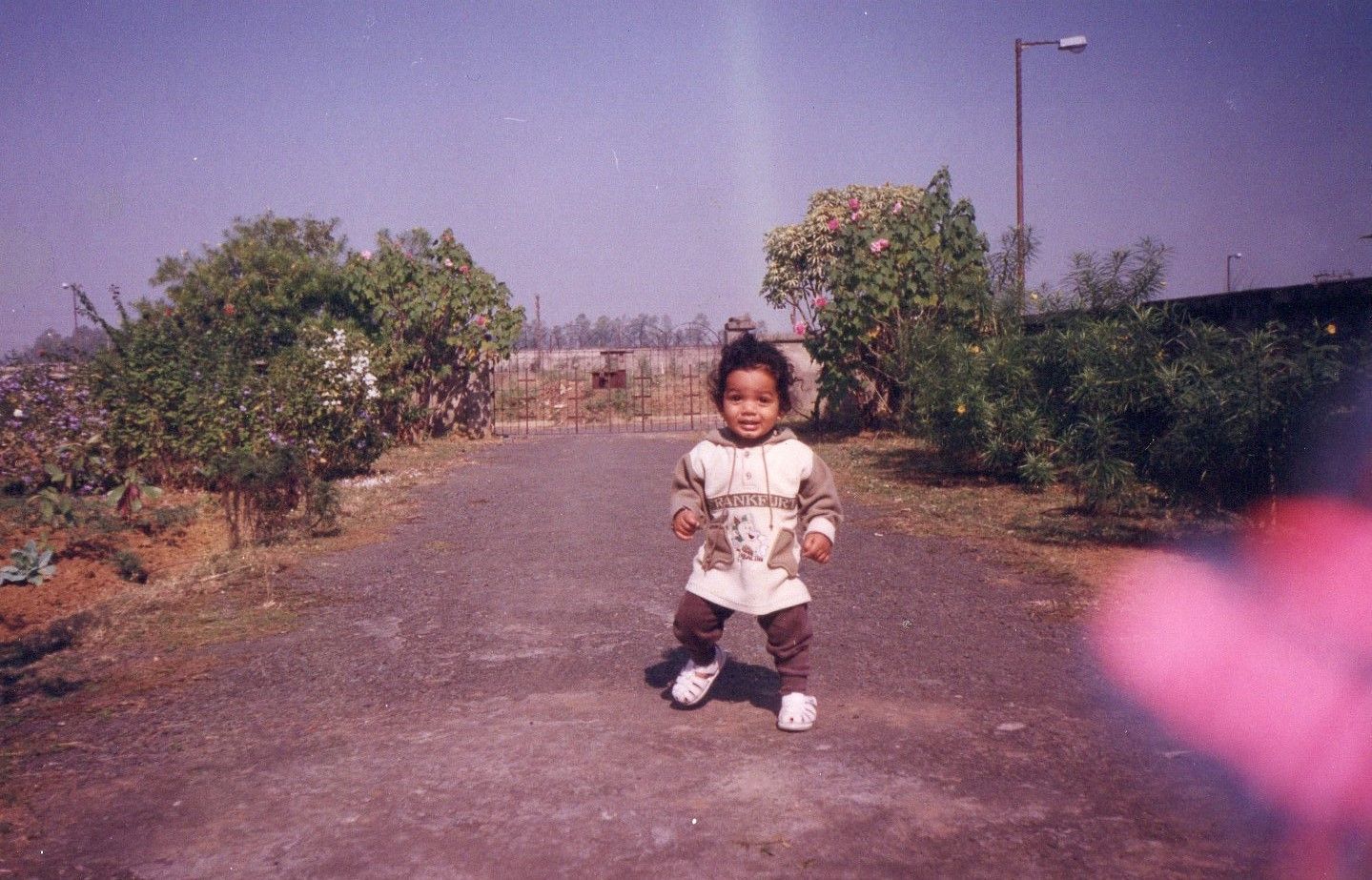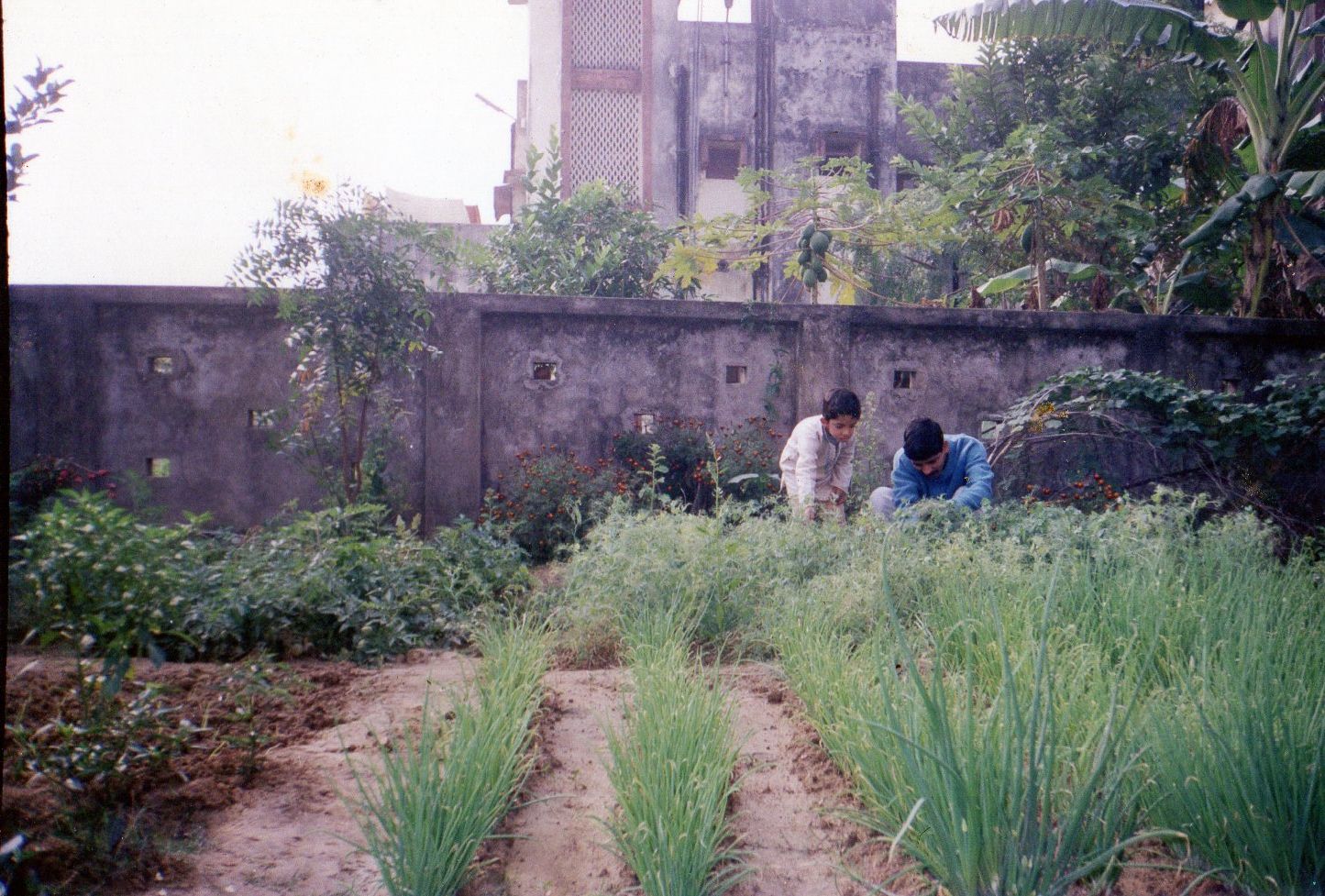My father and I gardening away, temporarily distracted by what I presume was an interesting beetle.
Before the break of dawn yesterday, I sat down at my window with a book I had been meaning to read for a while. Usually not the early bird, I was determined to finish at least a few chapters before the day started. But then I saw a cloud in the twilight sky and an earthy breeze wafted in, smelling of roses and incense and freshly drenched earth - and I suddenly remembered a Saturday morning from a long time ago, when I was just a ten-year boy staring at grey raindrops pattering away at my window.
So I put the book down and decided to write instead - about a weekend from the life of that ten-year old, and about thunderstorms in Bengal, nankhatai at a kitchen window, and cricket with my father.
I grew up in a small rural town in West Bengal called Mejia[1]. There, like in much of Bengal, the monsoons were often heralded by baisakhis - intense norwester thunderstorms with gale winds that uprooted trees in our backyards and lashed furious rain upon our rooftops. Lightning would incessantly scorch the surface in deafening thunderclaps; on days of hail it felt like nature had called in the heavy artillery.
It was easy to spot an incoming baisakhi shower because you could read and listen to the skies. Mejia was merely a smattering of settlements in the middle of nowhere with the largest buildings being two storied bungalows. I grew up in one of these bungalows, at the very edge of the town. If stood on my terrace, I could see where the walls ended and the countryside began, and the horizons would stretch all the way to farmlands hundreds of miles away. Nights were always clear and true and dotted with thousands of stars, and just before a baisakhi thunderstorm, there would be gigantic black clouds swallowing the southern sky in darkness. It used to remind me of a scene from a movie I loved, where Gandalf stood high in Minas Tirith, looked out at the war clouds of Mordor and called it the deep breath before the plunge. The air would suddenly turn very still, the birds would disappear in silence and my father would be scurrying to retrieve clothes hung out to dry.
No one would dare be caught outdoors once the storm began. At home, my mother and I would set camp in the kitchen, looking out at the backyard through the only window we could open without the wind shattering the panes. My mother would bake nankhatai and make tea with samosas; we'd watch in awe at the forces of nature as our papaya and guava trees swayed in the violent winds and our cabbage patch was flooded with sheets of rain. My mother would find this an opportune moment to retell me tales that her grandmother used to tell her - ghosts under peepal trees, madmen banging at doors after midnight, gods who would disguise themselves as beggars and snakes that could talk to children.

I freewheel at my grandfather's Bajaj Chetak while my mother admires her handiwork in the backyard.
"... and also because her feet were turned backwards," my mother ended one such narrative on one such evening, as she sipped at her tea while the wind howled outside. There was a stray plastic bag stuck to a twig on a tree, fluttering away in the storm like a wind balloon, and it had been turning spookier by the minute. I watched it quietly for a while longer, letting the story seep through me while the thunder roared away.
My father broke the silence when he came in for his second helping of samosas.
"I need to clear the garage tomorrow morning, once the rain has settled down. Will you help me?"
My way of helping my father was to usually hang around in his vicinity with a stray stick as my imaginary bat. I would mimic flamboyant cover drives and feel like Sachin Tendulkar, taking my imaginary helmet off after a hard earned century to a standing ovation at Old Trafford[2]. I did have a proper cricket bat, but it was heavier to wave at your fans. Sticks are a lot less work, especially since I scored many centuries at many venues in one day.
"Can we play cricket after it's cleared, Papa?"
"If we clear up the garage and the garden is not too muddy, sure. You need to improve your defence anyways."
The garage was our version of net practice. It opened up to a long stone driveway for the car to come through, but my father would just park our Maruti 800 outside, pull up the wickets against the back of the garage and measure 22 strides to mark the crease. Before I left Mejia almost twelve years ago, I remember how those garage walls were peppered with black, brown and dark green impressions that generations of tennis balls had left behind.
"Leave some for your son!" my mother mockingly swatted my father's hand away as he reached for another samosa. My father grinned at me in mischief.
"Tomorrow morning, then. Go to bed now, you need to be up early if you want to bat extra overs."

My younger brother decides to invade the pitch and interrupt the game. We needed an extra fielder anyways.
When I woke up, it was still drizzling.
My mother was at prayer, offering roses to portraits of Hindu deities and burning incense while she chanted in gratitude. My mother seldom asks God for anything, she says that it is very presumptuous of us to do so.
'Be thankful instead,' she would tell me when I was younger and had to listen, 'for the food you eat, the house you live in, for the people you have in your life, for everything good that has happened to you.' If you asked her if we could blame God for our misfortunes as well, she would get angry. 'No, you cannot blame God for your inability to memorize multiplication tables.' I remember thinking it was an unfair arrangement - God could seemingly do no wrong.
My father was already in the garage, umbrella by his side, tucking away at a stack of large cardboard cartons. Most of them had already been sorted while I had slept in. By the time I had jogged across the backyard to join him, he was standing over the last one in indecision.
'These are a lot of old newspapers, Papa. Are you going to sell them?'
My father liked to collect newspaper cuttings, and he was one of the few people who would read the entire paper from front to back, economic sections and editorials included. He seemed a bit reluctant to dispose of the stack lying in front of him.
'Yes I could sell them,' he said, 'or I could see if there are any interesting ones left - perhaps we can donate them to the library.'[3]
'Will anyone read them?' I asked.
'I don't know,' he said, looking out at the grey skies. 'By the way, looks like rain interrupted play, young man. I don't know if cricket is on the cards anymore.'
I was hoping for the otherwise.
'Can we not wait till the drizzle is gone?' I asked earnestly. 'I'll only play straight shots so the game stays on the driveway.'
My father chuckled.
'I don't mind playing in the rain or even getting our shoes muddy. What I mind is messing up your mom's last batch of carrots and onions. Shibu[4] spent a lot of time planting them but hasn't come by of late to gather and wash them. Ball goes wide even once, I'll have to step through the garden to get it back.'
I didn't have a response. It was just disappointing to know that I would not be wowing the MCG with my pull shots today, and it showed on my face. My father saw my crestfallen look and understood, as fathers usually do.
"Okay, as long as you promise to play only straight shots."
The wickets were already in the garage, so all I had to do was scurry home once more to get my bat, the only tennis ball we hadn't punctured yet, a baseball cap and a towel for my dad. We set up the bails, cleared box wrappers and cello tape off the "pitch" and decided to play two overs each. Finally, we agreed that we needed to rescind runs for sixes crossing the walls and landing in the wet grassland in front of our house. My dad, as usual, let me bat first.
The first ball was slightly pitched up, just outside off stump. It is the sort of delivery that bowlers gift to you when they're just getting into the groove. When they have an odd stride in their run-up, or their arm isn't free enough or there's a little moisture on the ball and it slips from your grasp a split-second early. I leaned in, instinct taking over, shifting my weight to the front foot the way my father had taught me. The bat swiveled in my wrists, moving effortlessly in a smooth, fluid curve. Powerful arms can lump runs on the board, my father used to say, but only your wrists can produce a fine cricketing shot. The ball rose off the garage floor in a puff of dust and met the bat's sweet spot, thwacking with the sound that batsmen spend hours chasing in the nets. It was an elegantly caressed cover drive, the sort of play you would pay to watch on a sunny afternoon after an hour in the stands.
Then physics took over.
The tennis ball rocketed off the middle of the bat into the ground, rebounding off the garage wall at an acute angle and springing across the road where it took one bounce before making an abrupt landing right in the middle of the carrot patch.
My father and I hurried to the crime scene, standing at the edge of the driveway and staring at that little green ball stippled with fresh mud.
'That was a very fine cover drive, young man,' my father finally said with a smile on his face, 'a very fine cover drive indeed.'
The mango tree and the rose bushes in the garden were resplendent from the rain, the drizzle was cool at the back of my neck and the smell of freshly drenched earth, petrichor, hung in the air, ever so slightly punctuated by the memory of incense and the foretelling of sambar cooking in the kitchen. Both father and son were quickly coming to terms with the realization that their early game of cricket had ended much earlier than expected.
But the ball stared back at us, merely five feet away, still and quiet in the morning rain, subtly mocking us in its invulnerability.
~ Here's some context as to where I grew up and why. Way back in 1996, a government company called the DVC had decided to start tapping into the vast coal reserves of the Raniganj Coalfields by commissioning the largest thermal power plant in West Bengal - the Mejia Thermal Power Station. With a 2340MW capacity, MTPS was responsible for a large recruitment drive in the region; most of the employees were provided government housing in a newly built town called the DVC Officers’ Colony, less than 15 miles west of the Durgapur Barrage. One of the employees who ended up in that colony was a Telugu man with a degree in mechanical engineering, a wife who couldn’t speak Bengali, and a one year old son - me. For the next eleven years, I would spend my most formative years in Mejia. I would be growing up in a bungalow with a mango tree and my mother’s vegetable patch in the backyard and listening to M.S. Subbalakshmi’s Suprabhatam every morning before an hour long bus ride across the rural countryside to attend school at St.Xavier’s, Durgapur. But that's a story for another day. ↩︎
~ A 17-year-old Sachin Tendulkar had scored his maiden century against England at Old Trafford on 9th August, 1990. I had never watched it, of course, but my father was the sort of man who would make sure you're aware of these things. I found the match report online much later. ↩︎
~ We eventually ended up saving those newspapers for making a wide variety of origami craftwork, the most notable variants were all paperboats. But that's a story for another day. ↩︎
~ Shibu was our gardener. Think of him as Dukhi from Ruskin Bond's stories, but make him look like a super villian. He had bloodshot eyes, stayed quiet, moved very slowly and deliberately, and looked you straight in the eye when he spoke. The fact that he almost always had a shovel in his hand didn't help the impression. Thankfully, he couldn't even hurt a fly if he wanted to, and loved tending to the flower beds. ↩︎


